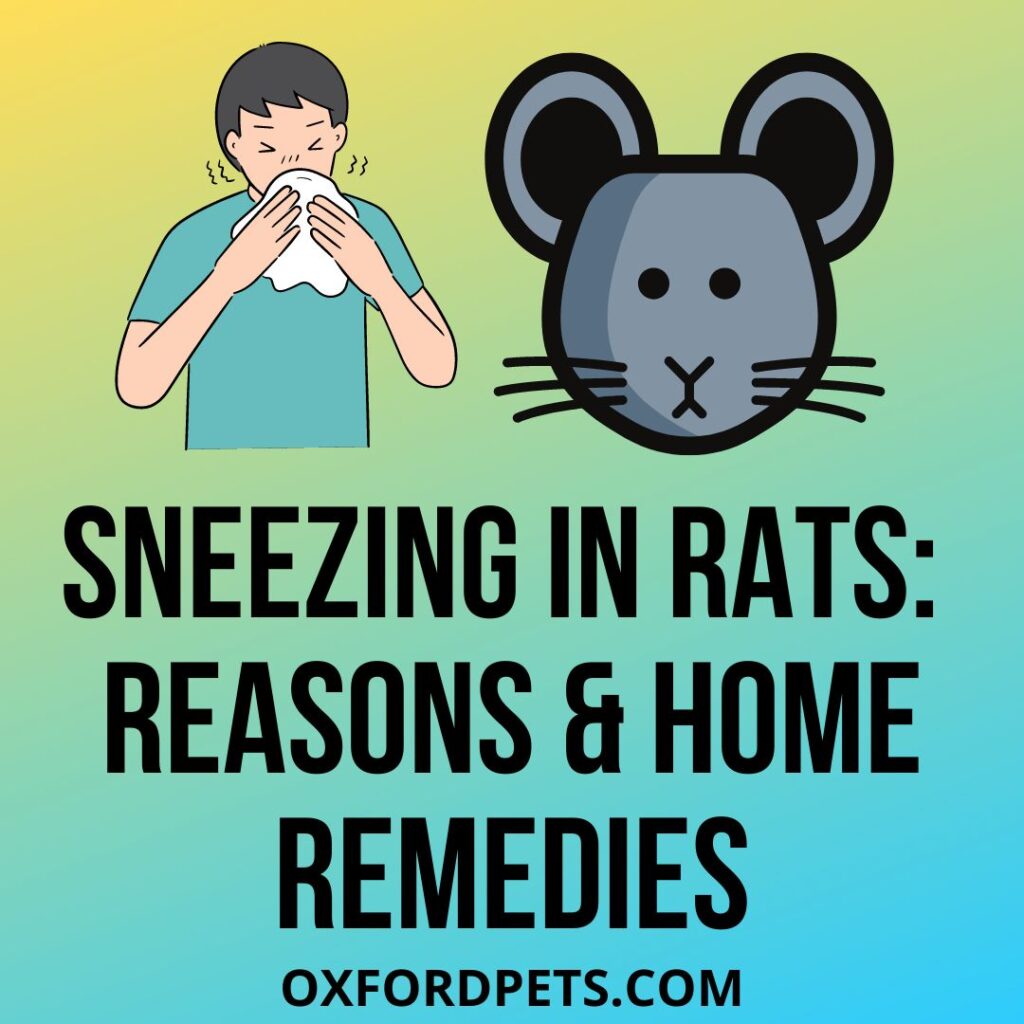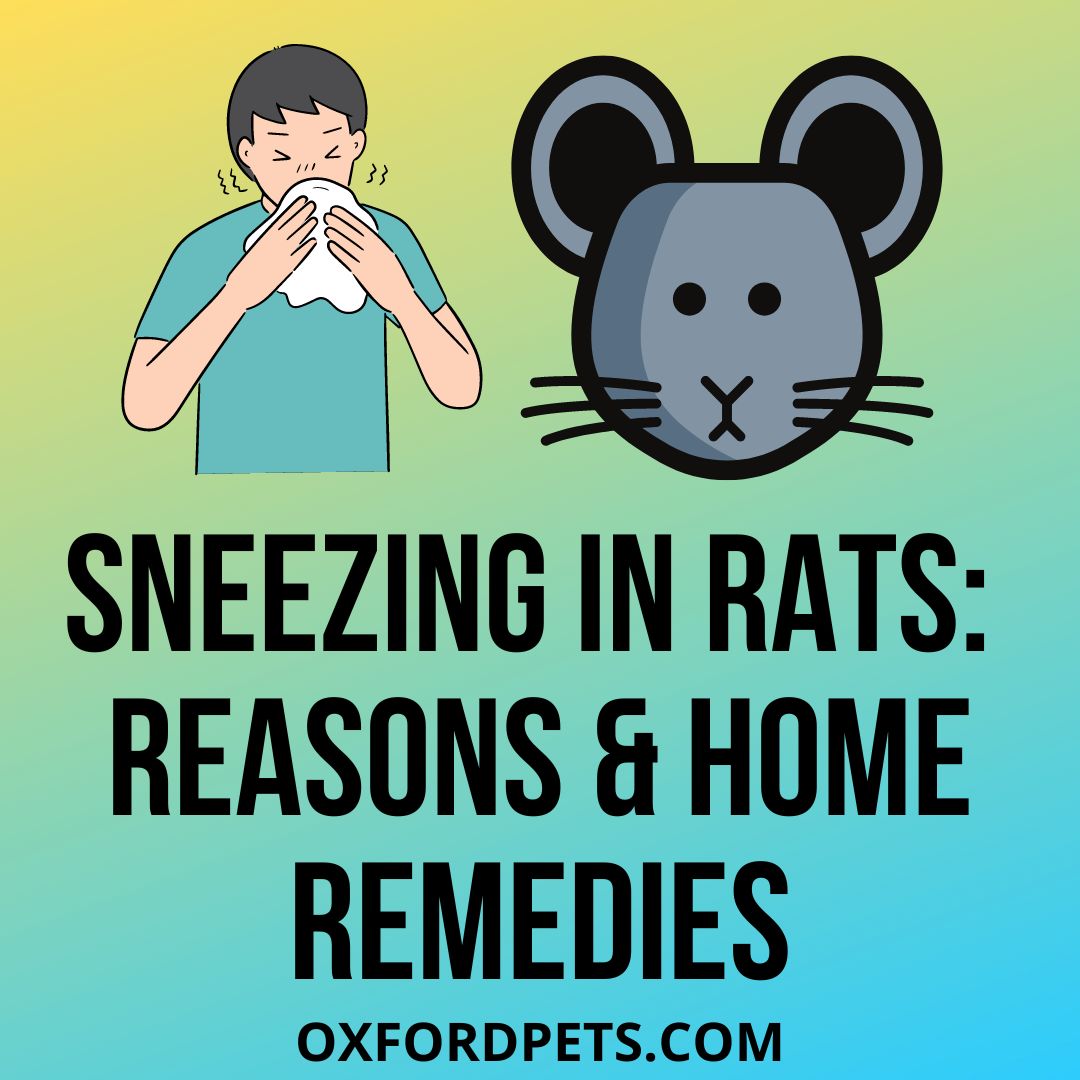Sneezing Rats: What’s the reason behind it? If you are a rat parent, you must have witnessed your pet rat sneezing once in a while. Most of the time it is nothing to be concerned about. However, in some cases, it is quite dangerous.
Contents
4 most common reasons for rat sneezing.

Weather change
One of the most common reasons for your rat sneezing is the weather change. Sneezing can also be caused due to windy weather as well. Moreover, it can also be due to frequently changing weather.
Changed environment
Sneezing happens when there is a sudden change in your rat’s surroundings. For instance, a change in the placement of their cage, a change in the house, etc. Actually, rats take time to adjust to new surroundings and often sneeze for 5-10 days.
Air pollutants
Rats have fragile lungs. Therefore, never keep your rat in the bedding that is dusty. Moreover, you must never keep your rat on softwood shaving.
Additionally, the same goes for a lot of events like a vacuum in the carpet, cleaning the house, or any kind of repair around the rat. Also, rats cannot handle ammonia. There you must avoid chemical sprays around them.
Strong perfumes can also be a potential reason for polluting the air around your rat.
Mycoplasma pulmonis
Most rats have myco. Moreover, it remains till the end. When the rat’s immunity becomes low, myco symptoms jump in and the rat starts sneezing.
Other symptoms include hiccoughing, chirping, laboured breathing, wheezing, etc. The most common antibiotic used in this case is Amoxicillin, Doxycycline, and Baytril.
5 Home Remedies To Prevent Sneezing in Rats
Many rats develop respiratory issues after changes in the usual environment.
Therefore, the most advisable thing is to make them comfortable and settle down to calm the sneezes.
- You can take them in the bathroom when you take a hot shower. Steam is good for respiratory irritation.
- Wash your rat’s bedding with unscented detergent once or twice a week.
- Try giving grapefruit supplements. Moreover, you can mix it with yoghurt and freeze it. Now you can use it as a treat.
- Add a drop of liquid Echinacea to a cheerio.
- You can feed dark chocolate as well.
5 Food items great for sneezing rats
Manuka Honey
Manuka honey has additionally been used as a good antibiotic for rats for plenty of years. Honey has also been used as a way to prevent, and deal with infections since historical times.
There has been a couple of research these days which have looked into the antibiotic properties of Manuka Honey and came to the belief that it’s powerful because of its hydrogen peroxide content.
Garlic
You can use granulated garlic while dealing with a respiratory infection in your rat. It is the best respiratory infection home remedy and has been utilised by many individuals.
Garlic is recognized to own some preventive and curative properties. Also, it has the capacity to combat many varieties of bacteria. Garlic is definitely safe for rats to devour.
Ginger
Another rat respiratory infection home remedy that human beings use is high-quality ginger. Ginger is safe for rats. However, fresh ginger can present problems when ingesting it. This is why maximum humans actually use ground ginger.
Thyme
Another home cure for respiratory infection in rats that you can try is to present them with ground thyme. It is straightforward to sprinkle over your rat’s normal food to get your rat to eat it and it’s also reasonably priced and easy to get a hold of.
Oregano oil
Although studies are still going on, it’s been shown that the oil of oregano enhances the immune system and features anti-inflammatory properties. It is likewise conceivable that it has some herbal antibiotics properties too.
Rat Respiratory Infections
There are some rat respiratory infections you must be aware of while being concerned for your rat.
Mycoplasma: A set of tiny generally parasitic bacteria that lack cell walls and sometimes cause diseases.
Mycoplasma pulmonis: A unique organism carried by almost all rats. These organisms colonise the luminal surface and apical cell membranes of respiratory epithelium.
As per ScienceDirect Murine Mycoplasmosis, is additionally regarded as Murine Respiratory Mycoplasmosis (MRM), or Chronic Respiratory Disease (CRD). In most rats, MRM is a chronic and modern disease, in which an infected rat can show various medical signs. Murine Mycoplasmosis results from mycoplasma pulmonia and is responsible for maximum respiration and genital infections in rats.
Rhinitis: A viral infection or an allergy can cause an infection of mucous membranes inside the nose.
Rat Respiratory Infections: Symptoms And Treatments
Symptoms of rat respiratory infections
- Upper respiratory infection – Sneezing, squinting, porphyrin staining around nose and eyes, shuffling, inner ear infection, ear or face rubbing, rolling, and head tilting.
- Lower respiratory infection – Laboured breathing, weight loss, behavioural changes, tiredness, gasping, chattering, coughing, nipping, biting, rough coat, etc.
How To Treat Respiratory Infection In Rats At Home
Keep the rat warm
When a rat suffers from respiratory disease, the immunity will go low if it is in a cold environment. Therefore, keep your rat’s cage away from air conditioning, open windows, etc. moreover, give him something warm to curl up in.
Moreover, you can also place a heating pad under his cage to warm him up. The ideal temperature for your pet rat is between 65 to 80 degrees Fahrenheit.
Set up a humidifier
Humidity has the potential to help animals and humans suffering from respiratory ailments. Hence, keep a humidifier outside your pet’s cage. It will help to reduce the congestion.
Change the bedding regularly
The ammonia in soiled bedding can irritate the nasal passage. Hence, change your rat’s bedding regularly. Moreover, this will help to eliminate allergens in the cage.
Preventing Breathing Problems in Rats
The most effective way to prevent respiratory problems is to keep the surroundings clean. Do not allow the rat to go near other stray rats. If your rat is sick, keep him away from mothers and also wash your hands properly after handling him.
Final words
In conclusion, I would say that sneezing in rats can be handled by keeping the surroundings clean. However, in some severe cases, they need special medical assistance. In case you feel your rat is having any sort of respiratory infection, take him to the vet. The vet will guide you through the process of recovery.
Moreover, keep the surroundings clean, change the bedding daily, and keep strong scents away. This will help your rat a lot.
I hope you enjoyed the article. I will be back soon with more interesting and informative pieces of writing. Till then, stay connected. Thank you.
Frequently asked question
How Can I Treat My Rat’s Respiratory Infection At Home?
The best way is to use a humidifier. A humidifier can help soothe the breathing passage and loss of secretion. If not a humidifier, you can also keep him in a heated mist bathroom for 15 minutes. This can prove very comforting.
What Should I Do If My Rat Is Sneezing?
If your pet rat is sneezing, make sure there is no other symptom. Or it is better to have a talk with the vet. This will help you cancel any severe problem.
Rat Gasping For Air
This is due to respiratory distress. In this condition, the rat gasps through its mouth and appears panicked. Moreover, laboured breathing is also considered respiratory distress in rats.
Why Is My Rat Having Sneezing Fits?
In rats, porphyrin comes out with a sneeze. Porphyrin is a parent compound which gives rise to bloody secretions. A bit of porphyrin is irritating. However, if there is a buildup, it is a potential sign of lung infection, urinary infection, ear infection, advanced pyoetra, or mycoplasma infection.
